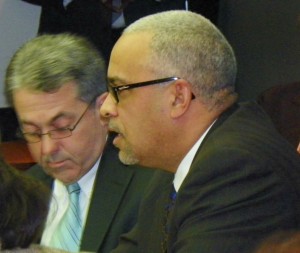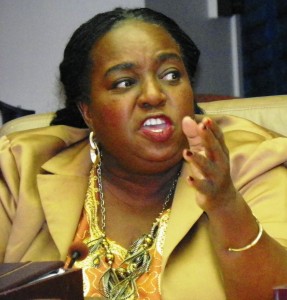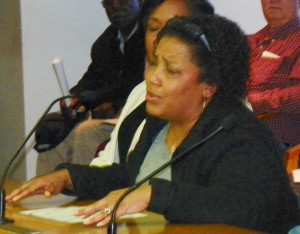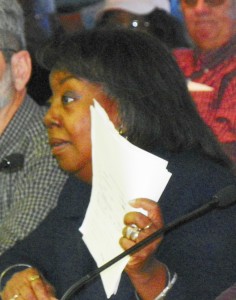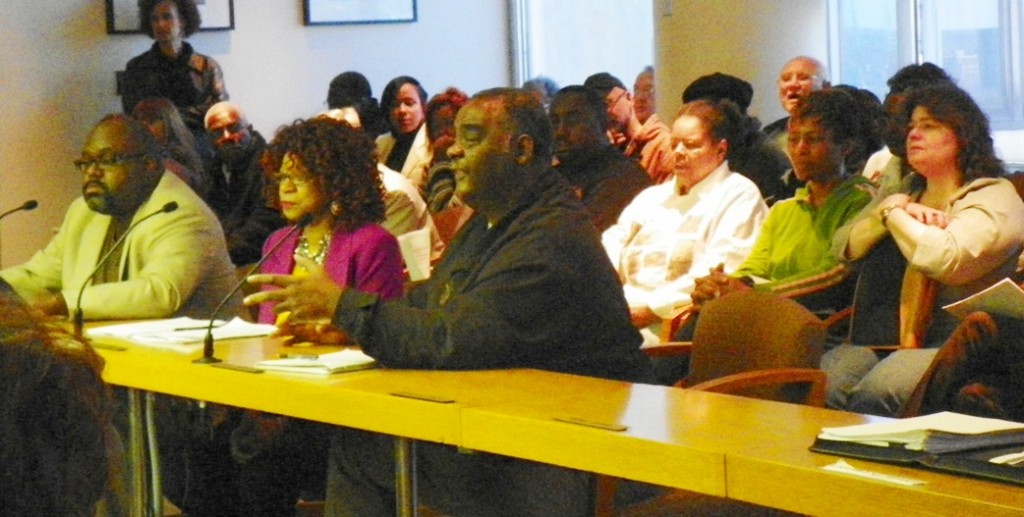
AFSCME Council 25 President Al Garrett threatens to shut the city down as union did for 20 days in 1986
By Diane Bukowski
April 4, 2012
DETROIT—Despite thundering threats by union officials and community members to “shut the city down,” and a scathing analysis by Detroit City Council’s Research and Analysis Division, the majority of council members today appeared hell-bent on voting for a Public Act 4 consent agreement, likely during a hearing scheduled for 10 a.m. April 3.
During the Council’s morning session, Mayor Dave Bing’s Chief of Staff Kirk Lewis and his attorney Michael McGee refused to present labor concession agreements signed by the administration and the city’s unions for council certification. The agreements were estimated to save the city up to $130 million. Lewis said they preferred to wait until the passage of a Public Act 4 consent agreement, when the city could impose more cutbacks.
He appeared with attorney Michael McGee, of the law firm of Miller, Canfield, Paddock and Stone. According to their website, “Over the past 25 years, Michael P. McGee has had primary responsibility for general obligation and revenue bond issues amounting to more than $3.5 billion , , , Michael has served as bond counsel and underwriters’ counsel for hundreds of transactions in various areas including economic development, transit and transportation.”
VOD has sent a Freedom of Information Act request to the City’s Law Department asking if McGee is being paid by the city, and in what amounts. Krystal Crittendon, head of the Law Department, expressed concerns about provisions in the consent agreement which were to be reviewed by Council later in the afternoon.
Council members JoAnn Watson, Kwame Kenyatta, Brenda Jones and Andre Spivey objected.
“This is an assault on the good faith collective bargaining process,” said Watson, who had planned to move for certification of the agreements. “There was a historical coming together of the unions and the city to save Detroit, and now because somebody from Lansing doesn’t like it, they are refusing to bring it to us.”
Michigan Governor Rick Snyder earlier threatened to appoint an emergency manager immediately if the union agreements were approved.
Watson initiated and has been a primary leader in the campaign to overturn Public Act 4, which the Democratic Caucus of the U.S. House Judiciary Committee has declared blatantly unconstitutional.
It usurps the powers of elected officials at virtually the whim of the governor and treasurer. Its primary goal is to ensure the payment of the city’s debt to Wall Street banks, according to noted labor historian Dr. Steve Babson, who spoke at the Council’s afternoon session, terming the agreement not only a takeover by the state, but by Wall Street.
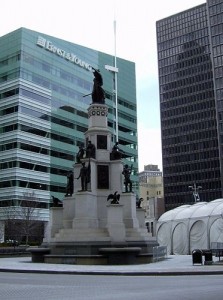
Ernst & Young is a global firm; its Detroit headquarters rise imperiously over the city's Campus Martius Park.
Council member Spivey asked for Ernst & Young’s updated version of the city’s cash flow analysis, which Council requested Feb. 2, and also raised reports that the city has not yet deposited millions of dollars in receivables. He said Ernst & Young, which first claimed the city would run out of cash by April 1, was brought in by the state. He also mentioned a March 8 memo from State Treasurer Andy Dillon commenting on the proposed union contracts.
“We won’t spend another dime negotiating more concessions at the table; we will let our contracts run until their expiration dates.” Al Garrett, President of Michigan Council 25 of the American Federation of State, County and Municipal Employees,” told Mayor Dave Bing’s chief of staff Kirk Lewis and the council. Bing has been hospitalized for surgery and expected to be out of commission for several weeks.
“The man is saying that Black folks who work for the City of Detroit will not have rights,” stormed Al Garrett, president of Michigan AFSCME Council 25. “Well, I’m saying that our 3,000 city workers who are left do have rights, and we will take this to the streets. You think we can’t, but I was President when we went out for 20 days in 1986. There is no coming back for more money. Snyder is nothing but a bully who hasn’t brought anything to the table. The state is not offering you a dime. He is insulting you, saying you don’t have the mentality to run the city but they do.”
(Click on CITY SERVICES IN DETROIT SNARLED BY STRIKE NYT to read New York Times article on 1986 Detroit strike.)
The Coalition of City Unions told U.S. District Court Judge Arthur Tarnow that afternoon that the state had “tortiously” interfered in the bargaining process, but Tarnow denied their motion for a restraining order the following day.
Ingham County Circuit Court injunctions by two judges barring the Council from approving the consent agreement until a hearing, and barring the Financial Review Team from meeting to sign off on the pact, were overturned by the state Court of Appeals, which is still set to hear arguments on the matters.

Financial Review Team meeting March 21 2012 Highland Park school board member Robert Davis, who has sued to charge violations of the Open Meetings Act
Lawsuits brought by Robert Davis and AFSCME represenatives said the state review team violated the Open Meetings Act.. A March 26 report issued by the team lists numerous private meetings. (Click on Detroit Review Team Report 3-26-12 (3) to read full report. A story on the team’s contentious March 26 meeting is upcoming.)
“In 1986, when I was President, we shut this city down for 20 days,” Garrett said. “Governor Rick Snyder is a bully who hasn’t brought any money to the table, and insults you by saying you don’t have the mentality to run the city but says they do.”
AFSCME Council 25 is the largest union which is part of the Coalition of City Unions, representing over 5,000 non-uniformed city workers.
“Clearly the New York bankers are expecting their money,” Dan McNamara, president of the Detroit Firefighters Association, said. “For the first time, our members voted overwhelmingly for concessions, but the Treasurer has not approved them. Lansing has whittled down PERA (the Public Employee Relations Act). When we’re done, no one will have any rights. Our new leaders in the fire department have downgraded fire protection levels. We cannot stand for any more of this.”

Detroit police, firefighters and other city workers demonstrated May 6, 2010 against $6B pension fund takeover
The proposed consent agreement brought to the council by Lewis that afternoon still maintains a provision that completely overrides PERA, clearing the way for a public workers’ strike, which PERA forbids. McNamara’s reference to the banks related to provisions in the consent agreement which make payment of the city’s debt its primary goal.
Toni Adams, a senior community advocate, said an elderly woman died the morning of March 22 during a fire at a senior building.
“If you take any more, more of our elderly will be dying,” she said.
Long-time community activist Valerie Burris said, “The community will be behind the unions every step of the way. We will organize car pools to get people to work and have them pay the drivers the amount of bus fare. We will stop paying our property taxes and our water bills. If we have to, we will dig wells in our backyards.”
Herman Dooha, the 89-year-old widower of Maryann Mahaffey, who presided over the City Council for several decades, said he was appalled and that his wife would have never agreed to the state’s proposal.
“This has never been a city where the council gave up our rights,” Dooha said. “The council is the voice of the people. The governor wants to put in power unelected officials to run our city.”
Many Detroiters at the table criticized Councilwoman Saunteel Jenkins, who prominently displayed her time on Mahaffey’s staff in her election campaign literature. Jenkins has failed, however, to carry on Mahaffey’s legacy.
Among others speaking against the agreement at Council’s April 3 session was Edith Lee Payne, who told the Council they have an obligation under their oath of office to represent the interests of the people of Detroit. Payne, who marched with Dr. Martin Luther King, Jr. during the 1960’s, is one of the litigants in a state-wide lawsuit challenging the constitutionality of Public Act 4.
That lawsuit has been held up by the State Supreme Court, which refused to allow an Ingham County Circuit Court judge to hold an initial hearing on it. The state’s top court has since delayed its own consideration of the lawsuit indefinitely.
David Whitaker, director of the Council’s Research and Analysis Division (RAD), issued a report on the consent agreement dated April 2, which said, “The document under consideration is one of the most important government documents—perhaps the most important in the city’s history. The inadequate time to discuss, analyze and understand its full, detailed consequences looms over this entire discussion and its ultimate resolution.”
The report says it would likely take two or more weeks to do so. Meanwhile, the State Board of Canvassers is examining a sample of 35,000 signatures from nearly 240,000 submitted by voters to conduct a referendum to repeal Public Act 4. Councilwoman Watson said they are expected to complete certification within the next two weeks.
(Click on ConsentAgreement-RADreview4-2-12 to read full report from Council’s Research and Analysis Division.).
In brief, the report says the proposed Consent Agreement, disingenuously called a “Financial Stability Agreement,” greatly compromises the powers of the city’s elected officials.
“In the event disputes arise over execution of the FSA reform initiatives, City government officials’ ability to self-govern is by the terms of this agreement ceded to the Financial Advisory Board. Potential choices in opposition to those of the Program Management Director [PMD] would likely be defined as ‘Reform Default Condition.’”
The report says the PMD “would have the ability, with Board approval, to design, develop, implement and execute the new reform operational structure of city government . . . S/he could take control of disputed areas of policy and spending from the City, without the ability of the City to effectively oppose it. . . The terms of the document itself do not premise such a conditional right to control on any corresponding cash contribution to the City’s budget for services to Detroit residents.”
McGee made clear to the Council that the governor wants the FSA to be considered a consent agreement under Public Act 4. He said the agreement still provides for an over-arching Financial Advisory Board and “a degree of state compulsion to achieve the Reform Program of restructuring City government,” as well as exempting the city from the provisions of PERA.
He said the provision taking away Council control of contracts over $250,000 has been eliminated, and that the state and city will split the costs of salaries and expense for the FAB.
The revised agreement takes out any reference to Public Act 7, the Urban/State Cooperation Act. That agreement requires a public hearing before any action is taken under it.
Whitaker said there is no state statutory authority for the establishment of the Financial Advisory Board, with its sweeping powers.

